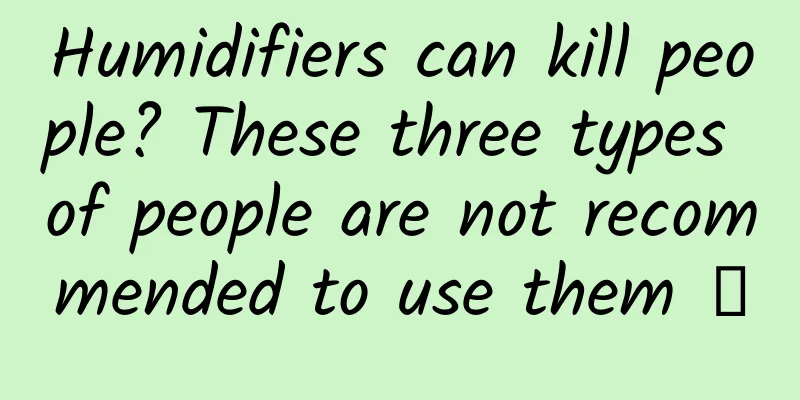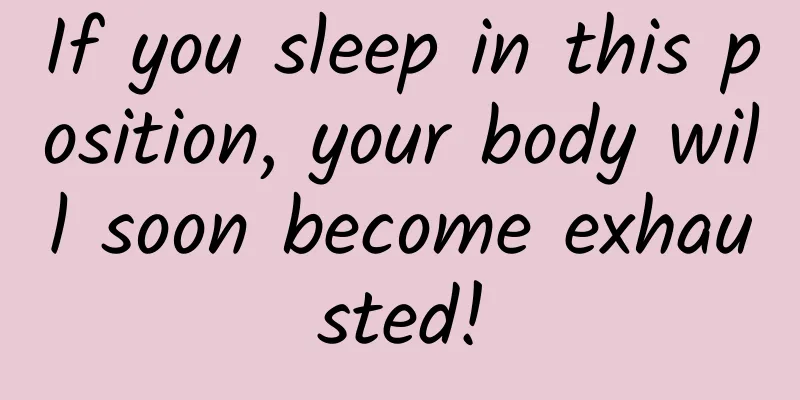Humidifiers can kill people? These three types of people are not recommended to use them →

|
As the weather gets colder, whether in the north or the south, winter heating facilities will more or less make the indoor air dry, so humidifiers have become a must-have small appliance for many families. However, there are endless rumors about humidifiers, such as: humidifiers can cause respiratory diseases, etc. Are these true? Let's take a look! Rumor 1: Using a humidifier will cause respiratory diseases? Humidifiers can indeed relieve the discomfort caused by dry indoor air and low humidity. However, if used improperly, they may also cause respiratory diseases in our bodies, which is medically known as "humidifier pneumonia". This is because harmful microorganisms enter the human respiratory tract after being atomized by the humidifier and cause inflammation, resulting in a series of respiratory diseases such as colds, bronchitis, asthma, etc. Common manifestations are nasal congestion, coughing, sputum, wheezing, fever, etc. In fact, the existence of "humidifier pneumonia" is not the fault of the humidifier itself, but is caused by improper use of the humidifier, such as: 1) If the humidifier is not cleaned in time , it is easy to absorb and breed bacteria and viruses, which will then become bacteria-containing water mist through the humidifier and be inhaled into the respiratory tract, causing various respiratory diseases. 2) Humidification time is too long , resulting in excessive air humidity, which is conducive to the growth of bacteria and viruses in the air, which enter the lungs with breathing and cause respiratory symptoms. 3) The water used in the humidifier is of poor quality and contains bacteria, viruses, etc. The bacterial mist formed by the humidifier is inhaled into the lungs, which may also cause a series of respiratory diseases. Rumor 2: Humidifiers can kill people? In 2011, a series of suspicious deaths occurred in a Seoul hospital among patients hospitalized with symptoms of pulmonary fibrosis. These patients had the same cause of death: unexplained acute lung disease . Because the deceased were all pregnant women, it caused a great deal of panic in Korean society. Finally, the Disease Control Headquarters of the Ministry of Health and Welfare of South Korea conducted a large-scale epidemiological investigation and ruled out the possibility of an epidemic virus causing the disease. In subsequent investigations and experiments, it was preliminarily determined that "humidifier disinfectant" was the culprit that caused the deaths of pregnant women and others suffering from unknown lung diseases. That’s right, the culprit is this “fungicide” ! When we use a humidifier, in addition to adding the main raw material water, some friends also like to "DIY" it, such as adding fragrance, vinegar, etc., and disinfectant is also one of these "condiments". What is a fungicide? This refers to a chemical substance that can kill or inhibit the growth of bacteria or fungi that cause certain diseases when used in a certain dose or concentration . Although fungicides can prevent the growth of certain bacteria, excessive use can be harmful to the human body. The fungicide is dissolved in water and then sprayed into the air through a humidifier. After being absorbed by the human body, the epithelial cells of the lungs and bronchial tubes will be stimulated. Over time, the cells will be damaged and inflammation will occur. In addition, the lungs are prone to fibrosis in the process of repairing damage many times. This is the truth behind "humidifiers killing people"! Does that mean that if we don't add "fungicides", everything will be fine? No! It's best not to add vinegar and essences ! The vinegar we usually use has no bactericidal effect, and essences contain certain chemical ingredients. No matter which one is added to the humidifier, it may cause respiratory discomfort! But there is no need to completely reject humidifiers. As long as you buy regular products and operate them correctly according to the instructions , you don’t need to worry about ensuring a comfortable environment. Rumor three: Adding tap water to a humidifier is equivalent to inhaling smog? Some people find that the PM2.5 detector readings have gone up after using a humidifier with tap water. Today's air purifiers all use particulate matter as the detection standard, so it is believed that humidifiers cause serious indoor pollution, but this "pollution" is not the same as haze . According to Guangming.com, the PM2.5 detector used in daily life adopts the "light scattering method", and all aerosol particles are its detection objects. It itself cannot identify water vapor and harmful particles. Theoretically, the content of particles with a diameter of less than or equal to 2.5 microns is the PM2.5 index. The size of the water vapor particles produced by the humidifier is between 0.5 and 10 microns, and a considerable part of the water vapor particles are close to the size of fine particles, so it is no wonder that the readings of the detector will rise sharply. Despite this, we still have to be careful of the health risks. Peng Yingdeng, a researcher at the National Urban Environmental Pollution Control Technology Research Center, once said that tap water contains calcium and magnesium ions and some impurities, which do have a certain negative impact on health after being sprayed out with mist. Therefore, Peng Yingdeng suggested that it is best to use distilled water or purified water with fewer impurities and more safety, and try to use tap water as little as possible . Rumor 4: Are the “side effects” of humidifiers unavoidable? When the air is dry in a room with air conditioning turned on for a long time or after heating in winter, you can use a humidifier to improve the air humidity, relieve and avoid skin dehydration, dry mouth, etc. However, long-term use of humidifiers will bring us some "side effects". Are these "side effects" unavoidable? In fact, as long as you pay attention to the way and method , you can avoid the "side effects" it brings: 1) Generally speaking, it is comfortable to keep the air humidity at 40%-60%. You can prepare a hygrometer at home, and then adjust and use a humidifier according to the specific situation of each day to keep the room within the appropriate humidity range. 2) The location of the humidifier is also important: first of all, it should be away from the power socket in the home , and it is best to place it at a height of about one meter from the ground . This is not only safe, but also more conducive to the distribution of water mist produced by the humidifier and balancing the humidity. 3) The water in the humidifier must be changed every day . Tap water cannot be used. It is generally recommended to use purified water to avoid the bacteria in the tap water spreading into the air through the water mist of the humidifier and inducing respiratory diseases. 4) Do not add vinegar, essential oils, perfume, etc. to the humidifier . These ingredients can be atomized and inhaled into the lungs, which can easily induce allergic rhinitis or asthma. 5) The humidifier should be kept clean. Generally, it needs to be cleaned once every three days of use : first soak it in hot water for disinfection, then rinse it with running water, and finally wipe off the scale with a clean cloth. Also, pay attention to clean the small grooves in the humidifier as much as possible. 6) If the humidifier is not used for a long time, be sure to pour out the waste water , air dry the water tank, and store it for future use. In addition to these correct usage methods, we do not recommend the following people to use humidifiers due to their special physical conditions and constitutions: 1) People with rheumatism or rheumatoid arthritis should use humidifiers with caution, because humidifiers will increase the humidity in the air and make them feel uncomfortable. 2) People with chronic lung diseases such as bronchitis, asthma, and COPD should use the humidifier with caution, because improper use of the humidifier can easily induce the onset of such respiratory diseases. 3) The elderly and children should use it with caution because the respiratory mucosa of the elderly and children has poor resistance and the air humidity is high, which can easily breed bacteria and viruses and induce respiratory diseases. |
>>: How come the cute little "rabbit" turned into a noodle spirit when he grew up? !
Recommend
Urgent release! iOS14.7.1 official version update, fix issues
This time, the official version of iOS14.7.1 was ...
Use two pictures to tell you why your app freezes?
[[192710]] What's the material? You can get t...
If you want to minimize your intake of nitrite, how should you eat vegetables?
You may have heard that nitrite can be used to pr...
Tips for B Station UP Masters to Sell Products
Nowadays, traffic costs are gradually rising and ...
The most weight-loss-enhancing fruit in autumn, I won’t let you not know!
Autumn is here. There is a kind of fruit with gol...
Jurassic World 3 is released, and the top Mosasaur is criticized for not appearing enough?
Breaking news: There’s a new movie in the “Jurass...
Xi'an high-end catwalk selection is arranged throughout the city, recommending exciting projects that you have never experienced, 100% of repeat customers like it immediately
Xi'an high-end T-stage elections are arranged ...
National Hair Care Day丨People born in the 90s are all losing their hair…Save your hairline, see if your hair loss is real or fake?
In recent decades, the number of people suffering...
Little-known facts about teeth cleaning | 90% of people don’t know!!
After teeth cleaning, my gums are red, swollen an...
To be a good operator, you need to know these 157 tools!
When you first enter operations , your leader ass...
Are “artificially modified” pets cute or pathetic?
I have loved animals since I was a child. I have ...
How to make the name of the mini program bring its own traffic? What name can a mini program have that is easy for people to remember?
Q: How to make the name of the mini program bring...
AARRR model of user growth!
User growth is essentially a precise, low-cost an...
Subaru's sales in China have dropped by nearly 50% in the past five years. The headquarters will provide a subsidy of 3,300 yuan for each car sold.
The Subaru store of Beijing Laiguangying Zhongji ...









